Finding the right risk management and compliance courses in Australia can be a challenge. For professionals in construction and manufacturing, practical training is an operational necessity. You need skills that directly apply to managing site risks and meeting regulatory obligations. Theory-heavy courses often miss the mark, leaving you with a certificate but no real-world tools.
This guide gets straight to the point. We have organised the top training providers across Australia to help you make a clear decision. Instead of just listing options, we provide a practical breakdown of what each provider offers, who it's for, and how the training is delivered. We will cover nationally recognised qualifications and specific government modules.
Our goal is to give you a clear, side-by-side comparison so you can choose the best risk management and compliance courses for your role and industry. Each entry includes direct links and a snapshot of the user experience, making it simple to find a program that delivers actionable knowledge. We'll explore providers organised by their presence in key states, giving you a comprehensive overview of the training landscape.
1. New South Wales (NSW) & National Focus: Governance Institute of Australia
The Governance Institute of Australia is a foundational resource for professionals who need to understand the formal frameworks that govern risk and compliance at a corporate level. The Governance Institute provides the bigger picture, making it useful for managers in manufacturing or construction who need to connect daily operations with corporate obligations.
Their risk management and compliance courses are built for the Australian regulatory environment. This means the content, case studies, and legal frameworks discussed are directly applicable to companies operating in NSW and nationally. The focus is on practical application within Australia.
Who is this for?
This provider is best suited for operations managers, compliance professionals, and senior leaders. If your role involves reporting to a board, managing corporate risk registers, or ensuring organisational compliance, their curriculum will be relevant. It helps bridge the gap between site-level hazards and enterprise-level risk strategy.
Course Structure and Delivery
The Institute offers a flexible and structured learning path, allowing you to choose the depth of knowledge you need.
- Short Courses: These are one or two-day workshops (available face-to-face in major cities like Sydney or via live virtual classroom) focused on specific topics like risk assessment techniques or compliance obligations.
- Certificates: For a more comprehensive understanding, their certificate programs provide a deeper education in governance and risk management principles. These are often self-paced, allowing you to fit study around your work schedule.
- Micro-credentials: These are quick, on-demand online modules that cover a single, focused topic. They are perfect for quickly filling a specific knowledge gap.
Practical Tip: When browsing their courses, pay close attention to the stated Continuing Professional Development (CPD) hours. The Institute clearly lists the CPD value for each course, and their verifiable digital badges make it easy to log your training for professional accreditations.
| Feature | Details |
|---|---|
| Primary Focus | Corporate Governance, Enterprise Risk Management, Compliance Frameworks |
| Best For | Managers, Directors, Compliance Officers |
| Delivery Formats | In-person workshops, live virtual classes, self-paced online modules |
| Pricing | Premium; course fees are aimed at corporate training budgets |
| Key Benefit | Content is specifically tailored to Australian standards and regulatory environments |
| Accreditation | Provides accredited CPD hours and verifiable digital badges |
Website: https://www.governanceinstitute.com.au
2. Victoria & National Focus: Australian Compliance Institute (ACI)
The Australian Compliance Institute (ACI) is a dedicated professional body for practitioners in compliance. Where other providers offer risk and compliance as part of a broader governance curriculum, ACI centres its entire focus on creating career pathways for compliance professionals. This makes it a good choice for individuals building a long-term career in the field.
Their nationally recognised qualifications, such as the Certificate IV and Graduate Certificate in Compliance & Risk Management, are designed to give professionals a formal, structured education. The curriculum is rooted in the Australian regulatory landscape, with a strong emphasis on practical application in areas like Anti-Money Laundering and Counter-Terrorism Financing (AML/CTF).
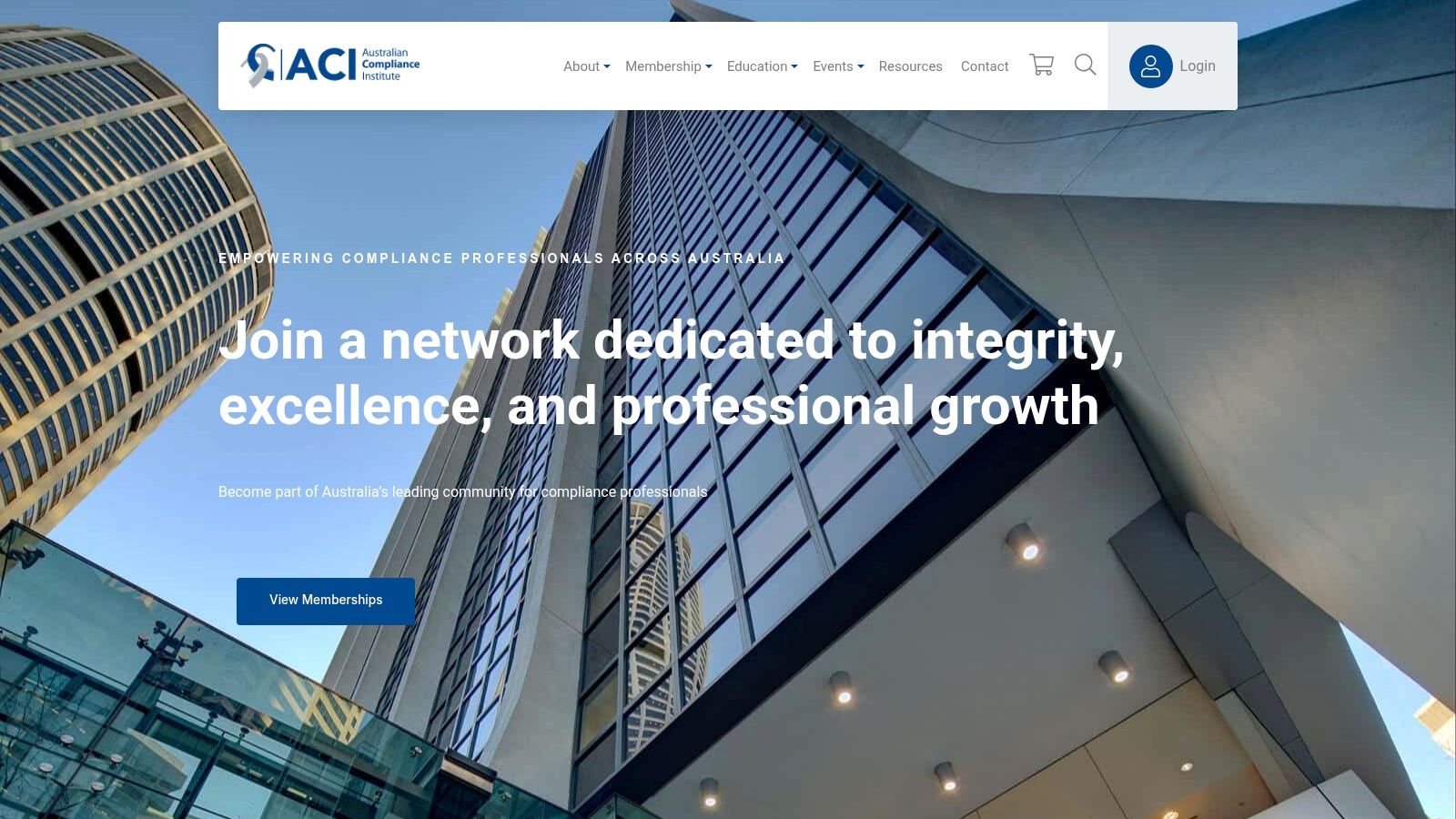
Who is this for?
ACI is for dedicated compliance practitioners or those aspiring to enter the field. This includes Compliance Analysts, AML Officers, Risk Managers, and internal auditors. If your goal is to gain an industry-recognised qualification and build a professional network within the Australian compliance community, ACI is built for that purpose.
Course Structure and Delivery
ACI provides a clear, progressive learning pathway from foundational knowledge to advanced strategic skills, delivered through a Registered Training Organisation (RTO #91640).
- Nationally Recognised Qualifications: Their core offerings are the Certificate IV and Graduate Certificate in Compliance and Risk Management. These are structured, in-depth programs delivered in cohorts, blending workshops, self-paced learning, and assessments.
- Specialised Programs: ACI offers targeted training, most notably in AML/CTF, which is critical for professionals in the financial services sector and other regulated industries.
- Community and Events: A key part of the ACI experience is access to a professional community, regular networking events, and industry updates.
Practical Tip: To get the most value from ACI, consider becoming a member. Membership provides access to their job board, networking events, and resources. Before enrolling, check the cohort start dates, as programs are not always on-demand.
| Feature | Details |
|---|---|
| Primary Focus | Professional Compliance, Risk Management Qualifications, AML/CTF |
| Best For | Aspiring and current Compliance Officers, AML Analysts, Risk Practitioners |
| Delivery Formats | Cohort-based programs, blended learning (workshops and online), events |
| Pricing | Program fees are available on enquiry and are often paid via corporate budgets |
| Key Benefit | Provides a clear, nationally accredited career pathway and strong professional community |
| Accreditation | RTO-accredited qualifications; their programs are well-regarded across Australian industries |
Website: https://compliance.org.au
3. Queensland & National Focus: Kaplan Professional
Kaplan Professional is a key provider for individuals and organisations within Australia's regulated financial services and insurance sectors. While other providers offer broad risk management principles, Kaplan specialises in the specific compliance qualifications required by the Australian Securities and Investments Commission (ASIC), particularly RG 146. This makes their courses necessary for anyone providing financial advice or managing compliance in that space.
Their risk management and compliance courses are designed to meet regulatory benchmarks. The curriculum is built around the specific knowledge and skill standards set by ASIC, ensuring that graduates hold qualifications that are recognised by employers across the finance and insurance industries.

Who is this for?
This provider is for financial planners, insurance brokers, compliance managers within financial institutions, and anyone needing to obtain or maintain ASIC RG 146 accreditation. If your role involves giving financial product advice or overseeing compliance frameworks in a bank, credit union, or insurance firm, Kaplan's structured pathways are built for you.
Course Structure and Delivery
Kaplan Professional’s delivery is entirely online and self-paced, offering flexibility for working professionals.
- ASIC-Compliant Programs: Their core offerings are the RG 146 Tier 1 and Tier 2 accreditation programs. These are structured learning paths with clear modules, online assessments, and final exams.
- Flexible Enrolment: You can enrol and start at any time. The self-paced model allows you to progress through the material on your own schedule within a defined course duration.
- Corporate Solutions: For organisations, Kaplan provides dedicated portals for corporate CPD tracking and reporting, making it easier to manage team-wide compliance and training records.
Practical Tip: When enrolling in an RG 146 course, review the specialist knowledge areas offered (e.g., General Insurance, Superannuation, Securities). Choose the stream that directly aligns with your professional practice to ensure the qualification is relevant to your role.
| Feature | Details |
|---|---|
| Primary Focus | ASIC RG 146 Compliance, Financial Services, Insurance Broking |
| Best For | Financial Planners, Insurance Brokers, Compliance Officers in Finance |
| Delivery Formats | Fully online, self-paced learning with rolling intakes |
| Pricing | Mid-range; course fees are typically paid by individuals or as part of corporate training |
| Key Benefit | Industry-recognised qualifications that directly meet Australian financial regulatory standards |
| Accreditation | Provides ASIC RG 146 compliant training and CPD points for industry professionals |
Website: https://www.kaplanprofessional.edu.au
4. Western Australia & National Focus: AUSTRAC e‑Learning (Government)
For organisations needing foundational knowledge in a specific area of compliance, the Australian Transaction Reports and Analysis Centre (AUSTRAC) provides a key resource. This government body's e‑learning platform offers free, authoritative training on Anti-Money Laundering and Counter-Terrorism Financing (AML/CTF) obligations. It is a starting point for any business defined as a 'reporting entity'.
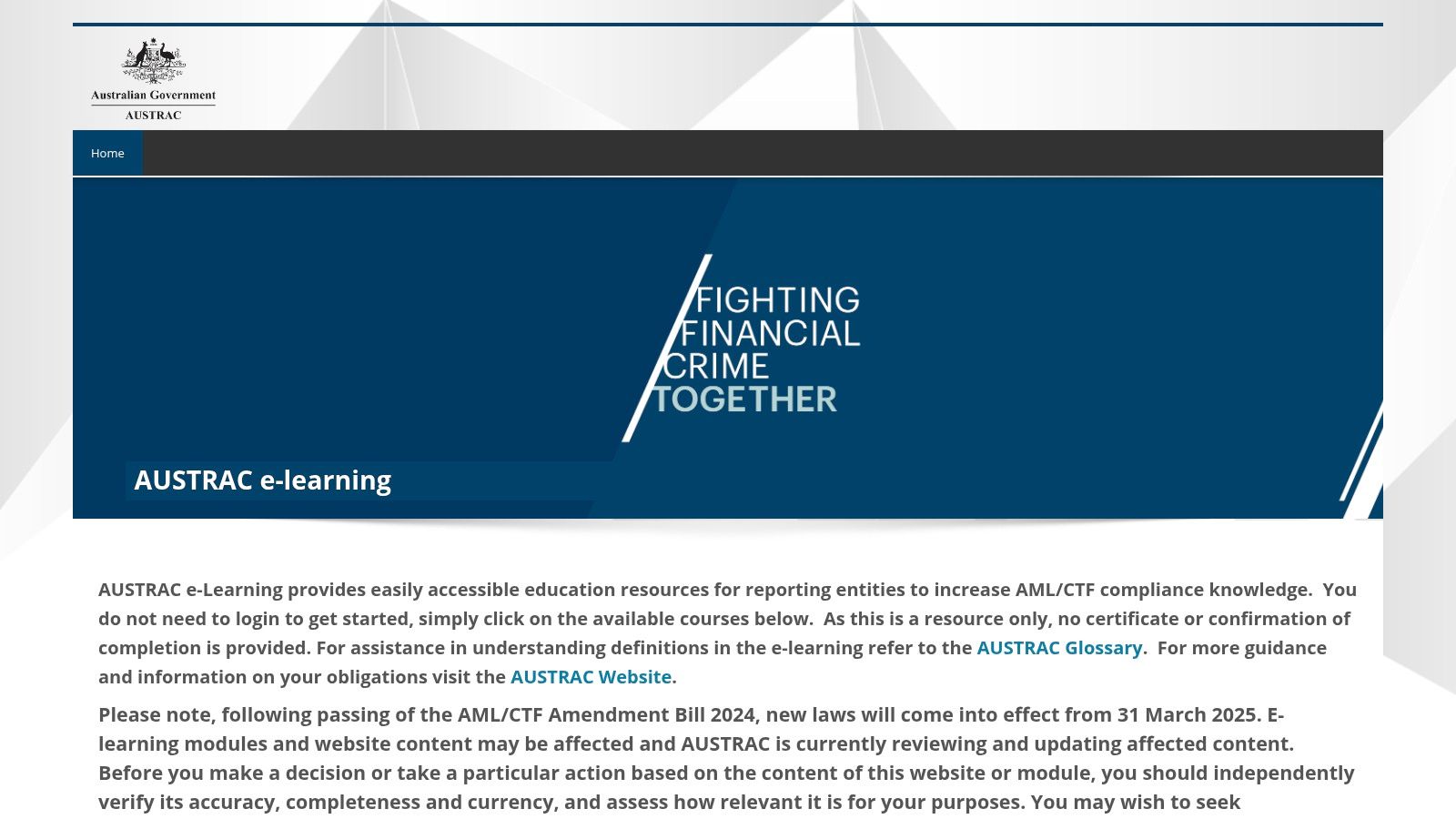
Unlike broad risk management and compliance courses, AUSTRAC's modules are focused on the legal duties your business has to detect and report suspicious financial activity. The content comes directly from the regulator, meaning it is the definitive source for understanding compliance requirements under the AML/CTF Act 2006. This makes it a no-cost tool for inducting new staff or for annual refresher training.
Who is this for?
This platform is designed for employees at all levels within reporting entities, such as financial institutions, bullion dealers, and digital currency exchanges. It is useful for frontline staff, compliance officers needing to build baseline company-wide knowledge, and managers in sectors that might not realise they have AML/CTF obligations.
Course Structure and Delivery
AUSTRAC offers a simple, direct, and accessible learning experience.
- Self-Paced Modules: The platform consists of several core online modules covering topics like financial crime basics, risk assessments, governance, Know Your Customer (KYC) procedures, and transaction monitoring.
- No Registration Required: There are no barriers to entry. You don’t need to create an account; just visit the website and start the modules.
- Quick Completion: Each module is designed to be completed in approximately 20–25 minutes, making it easy to fit into a busy workday.
Practical Tip: While these modules do not provide a formal certificate, you can create an internal record of completion. Ask staff to take a screenshot of the final screen of each module and submit it to their manager or HR. This creates a simple, auditable trail.
| Feature | Details |
|---|---|
| Primary Focus | Anti-Money Laundering & Counter-Terrorism Financing (AML/CTF) Compliance |
| Best For | Staff at reporting entities, compliance teams, new employees |
| Delivery Formats | Self-paced online modules |
| Pricing | Free |
| Key Benefit | Authoritative, regulator-produced content with no access barriers |
| Accreditation | No formal certificate; serves as evidence of foundational awareness training |
Website: https://elearn.austrac.gov.au
5. South Australia & National Focus: Open Universities Australia (OUA)
Open Universities Australia (OUA) acts as an online marketplace for higher education, bringing together risk management and compliance courses from various Australian universities onto one platform. It provides a pathway to formal, university-level qualifications without the traditional barriers of on-campus study.
Unlike provider-specific training, OUA allows you to compare subjects from different institutions like RMIT, Griffith University, and others. This means you can find a course that matches your career goals, whether you need a single subject to fill a knowledge gap or are committing to a full graduate certificate in risk management.
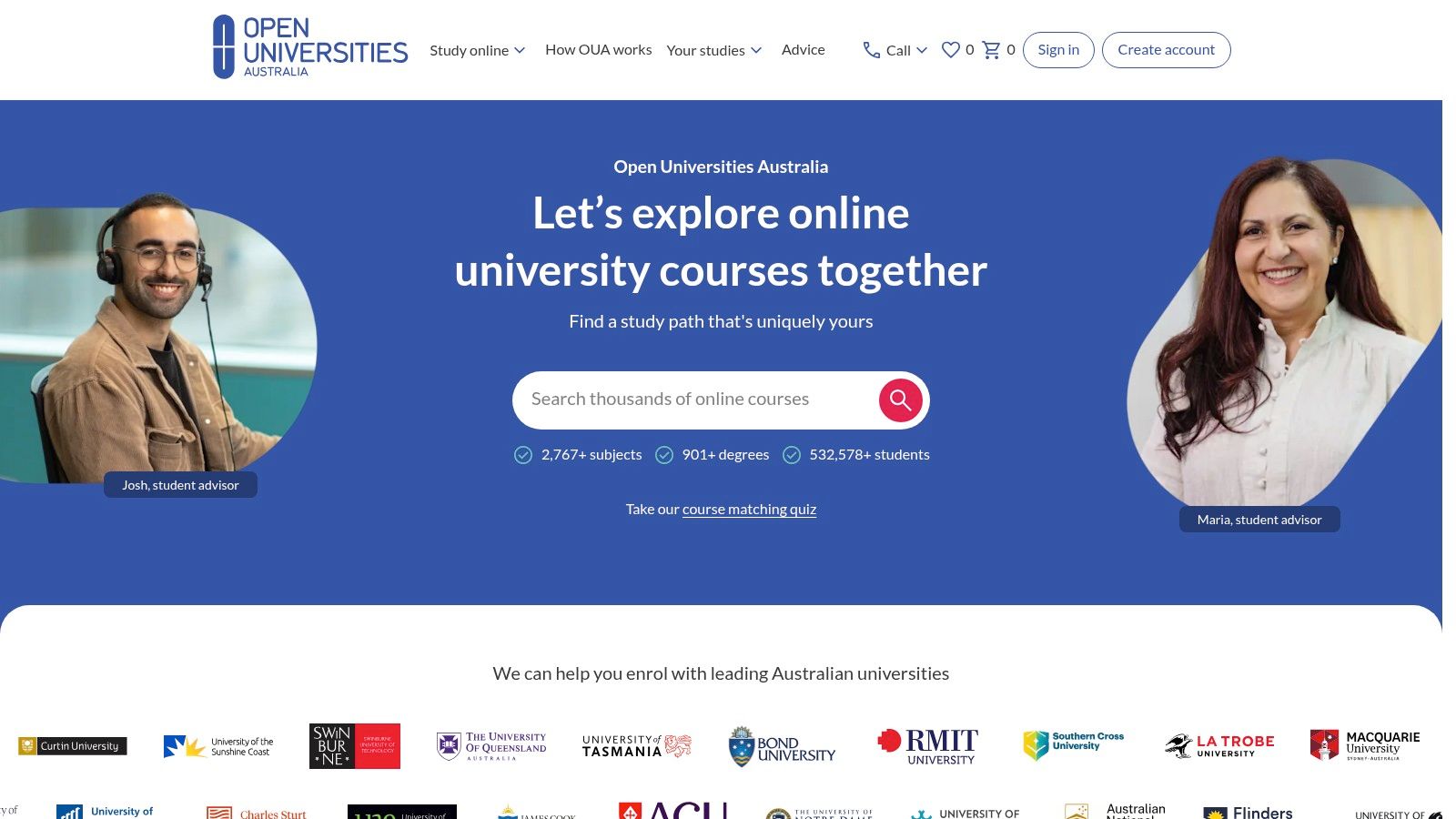
Who is this for?
OUA is for individuals seeking a university qualification in risk or compliance to advance their careers. If you are an operations manager, aspiring safety and compliance officer, or HR professional aiming for a senior role that requires a formal degree or graduate certificate, this platform offers a flexible way to achieve that. It's also good for those who want to try a single subject to see if a field of study is right for them.
Course Structure and Delivery
The platform centralises online university study, offering a consistent but flexible structure.
- Single Subjects: You can enrol in standalone subjects from a range of degrees. This is useful for targeted professional development and earns you a university transcript and academic credit.
- Full Degrees: OUA provides access to undergraduate and postgraduate degrees in fields related to business, governance, and risk. All study is conducted online with support from the chosen university.
- Flexible Enrolment: Most subjects have multiple start dates throughout the year, allowing you to begin studying when it suits you.
Practical Tip: Use the "single subject" option as a low-commitment way to gain a specific skill or test a university's teaching style. The academic credit you earn can often be transferred to a full degree later, making it a strategic first step.
| Feature | Details |
|---|---|
| Primary Focus | University-level single subjects and full degrees in risk, governance, and compliance |
| Best For | Professionals seeking accredited academic qualifications with flexible online delivery |
| Delivery Formats | Fully online with university tutor support and structured assessment deadlines |
| Pricing | Priced per university subject; HELP loans are available for eligible students and courses |
| Key Benefit | Access and compare accredited courses from multiple Australian universities in one place |
| Accreditation | Provides formal academic credit that can be put toward a university degree |
Website: https://www.open.edu.au
6. Tasmania & Online Focus: Coursera
Coursera brings university education into the online space, offering a catalogue of courses from globally recognised institutions. For Australian managers in manufacturing or construction, it provides access to international best practices in risk management and compliance, offering a different perspective from locally focused training providers. This platform is good for those looking to understand global frameworks or specialise in niche areas like financial risk or cybersecurity compliance.
The main advantage of Coursera is its flexible, self-paced learning model. You can access lectures from top professors and industry leaders from institutions like the University of Pennsylvania or Google. This makes it an accessible option for diverse teams and individuals.
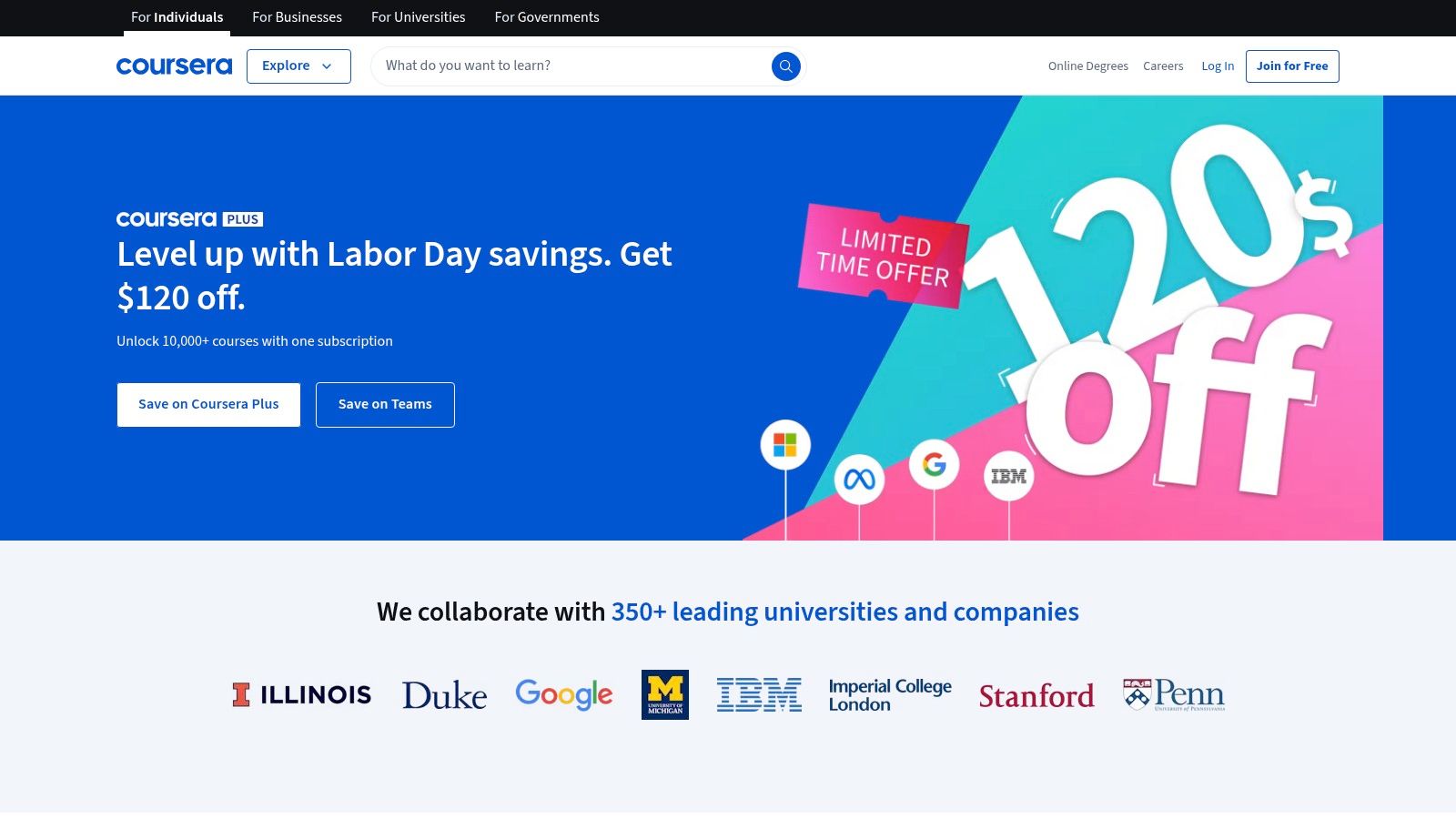
Who is this for?
Coursera is best for self-motivated learners, including compliance analysts and project managers who want to explore specific risk disciplines or gain credentials from global universities. If you need to understand international standards, such as those in supply chain risk or data privacy, Coursera is a good starting point.
Course Structure and Delivery
The platform organises its learning content into several accessible formats, all delivered online.
- Individual Courses: These are self-contained modules covering a specific topic, typically running over four to six weeks. You can watch video lectures, complete readings, and participate in graded assignments.
- Specialisations: A series of related courses designed to build knowledge in one subject area. Completing a Specialisation usually involves a hands-on project.
- Professional Certificates: These are career-focused programs from industry leaders like Google or IBM, designed to prepare you for a specific job role, such as a cybersecurity analyst.
Practical Tip: Use the 'audit' function. Most courses on Coursera can be audited for free, which gives you access to all the video lectures and reading materials. This is a great way to evaluate a course's content before deciding to pay for the full experience with a certificate.
| Feature | Details |
|---|---|
| Primary Focus | Global Risk Management Frameworks, Specialised Compliance (e.g., HR, Finance, Cyber) |
| Best For | Self-directed learners, professionals seeking international perspectives |
| Delivery Formats | Fully online, self-paced courses, specialisations, and professional certificates |
| Pricing | Varies; free audit option, subscriptions, or one-off payments for certificates |
| Key Benefit | Access to high-quality courses from leading global universities and companies flexibly |
| Accreditation | Provides verifiable, shareable certificates from issuing institutions |
Website: https://www.coursera.org
7. Australian Capital Territory & Online Focus: LinkedIn Learning
For professionals seeking on-demand learning rather than formal accreditation, LinkedIn Learning is a useful resource. Its strength is its large library of bite-sized courses taught by industry practitioners, making it useful for supplementing existing knowledge or getting a quick introduction to a new risk or compliance topic.
The platform has risk management and compliance courses that cover emerging areas like data privacy, cybersecurity risk, and ESG (Environmental, Social, and Governance) compliance. While it may not offer deep, accredited qualifications, its value is in its accessibility and the breadth of topics available.
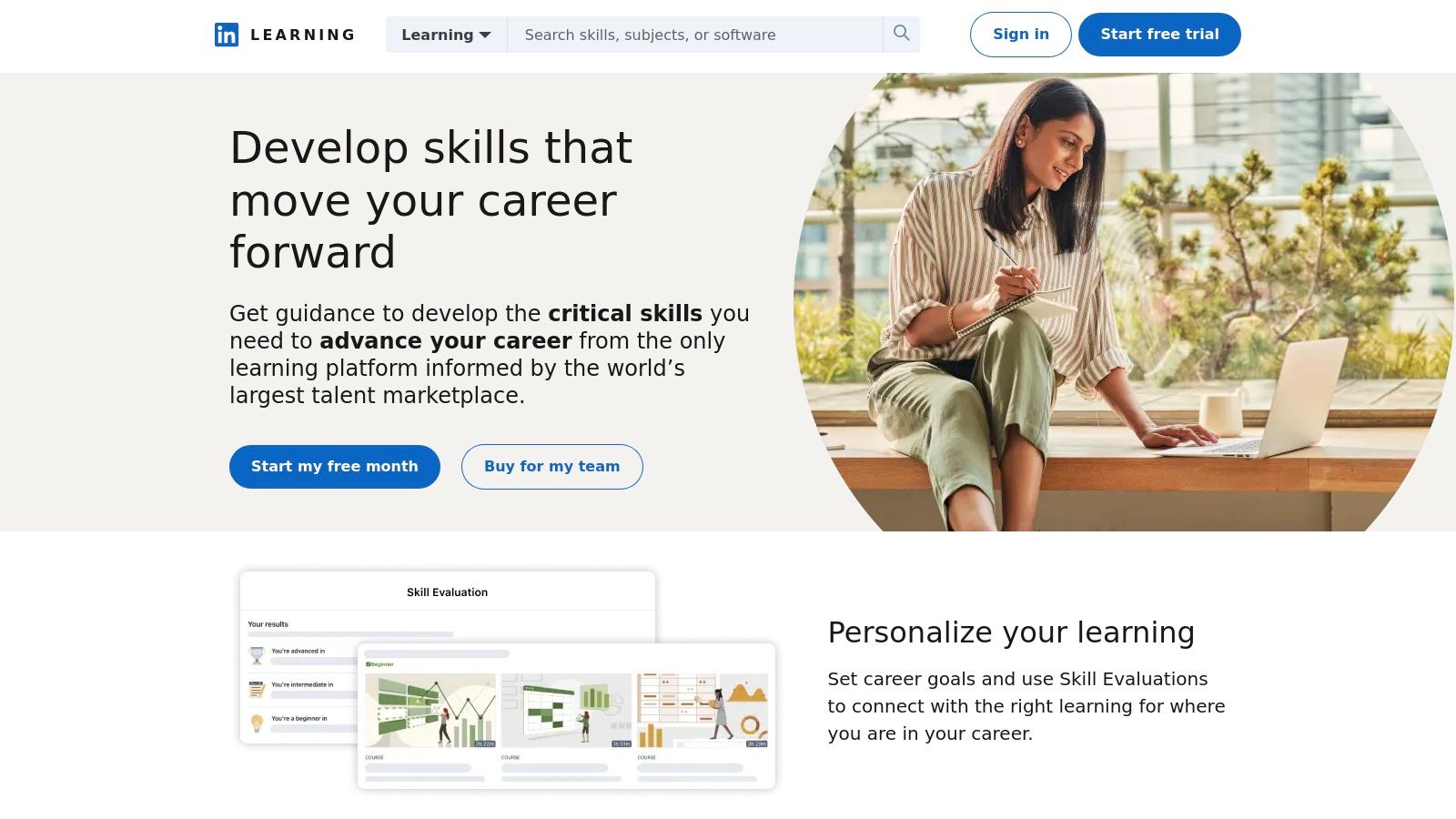
Who is this for?
LinkedIn Learning is for individuals at all levels who need to stay current with specific risk trends or for teams requiring scalable, consistent training on foundational compliance topics. If you need a quick primer on GDPR before a project, this platform is an efficient solution. It's less suited for those needing a formal qualification.
Course Structure and Delivery
The platform is built around flexibility and self-directed learning, with all content delivered online.
- Individual Courses: Most courses are video-based, broken down into short 2-5 minute segments. They range from under an hour to several hours and often include downloadable resources.
- Learning Paths: These are curated playlists of individual courses designed to build expertise in a broader subject area.
- Certificates of Completion: Upon finishing a course, you receive a certificate that can be added to your LinkedIn profile.
Practical Tip: Use the platform's search filters. You can filter courses by level (beginner, intermediate, advanced) and duration. For team training, create and share custom "Collections" of relevant courses to standardise learning across a department.
| Feature | Details |
|---|---|
| Primary Focus | Continuous professional development, specific skill acquisition, broad topic overviews |
| Best For | All professionals, team training, supplementing formal qualifications |
| Delivery Formats | Self-paced online video courses, curated learning paths |
| Pricing | Subscription-based (monthly/annual) with a one-month free trial; team pricing available |
| Key Benefit | Massive library of up-to-date content from industry experts, accessible anytime |
| Accreditation | Not formally accredited; provides Certificates of Completion for LinkedIn profiles |
Website: https://www.linkedin.com/learning
Risk Management & Compliance Course Comparison
| Provider | Implementation Complexity 🔄 | Resource Requirements ⚡ | Expected Outcomes 📊 | Ideal Use Cases 💡 | Key Advantages ⭐ |
|---|---|---|---|---|---|
| Governance Institute of Australia | Medium - practical, case-driven courses with flexible formats | Moderate - professional-tier pricing, multiple delivery modes | Accredited CPD hours, digital badges, certificates | Australian governance/compliance professionals needing local context | Australia-focused, flexible delivery, stacked learning |
| Australian Compliance Institute (ACI) | Medium - cohort-based structured programs | Moderate - cohort schedules, membership recommended | Accredited certificates, clear career pathways | Compliance practitioners pursuing formal qualifications and networking | Industry-recognized accreditations, strong community |
| Kaplan Professional (Australia) | Low to Medium - fully online, self-paced courses with exams | Moderate - online access, self-paced, CPD tracking | RG 146 compliance accreditations recognized in finance | Finance and insurance professionals requiring ASIC-compliant training | ASIC-aligned, enrol-anytime, recognized by employers |
| AUSTRAC e‑Learning (Govt. of Australia) | Low - quick, self-paced e-learning modules | Minimal - free access, no login required | Foundational AML/CTF awareness, regulator-verified content | Baseline or refresher compliance training for reporting entities | Free, regulator-authored, easy access |
| Open Universities Australia (OUA) | High - university-level subjects and degrees | High - fees, term schedules, academic credit standards | Accredited university credit, degree progress | Learners seeking university qualifications with flexible online options | Accredited academic credit, flexible enrollment |
| Coursera | Low to Medium - self-paced online courses | Low to Moderate - subscription or certificate fees | Professional certificates across broad topics | Global learners seeking flexible risk and compliance education | Wide course selection, free audit option, global brands |
| LinkedIn Learning | Low - short, bite-sized online courses | Low - subscription-based, includes free trial | Certificates of completion linked to profiles | Continuous micro-learning and team training | Large course library, practical focus, LinkedIn integration |
Putting Your Training into Action
Choosing the right course from the list of risk management and compliance courses available is a critical first step. You’ve seen the options, from the governance programs at the Governance Institute of Australia to the flexible online modules offered by Coursera. Each provides a different pathway to gaining the knowledge needed to navigate Australia’s regulatory landscape. The true value of any training program is realised when the knowledge is put into practice. In construction and manufacturing, this means turning theory into a daily operational process.
The real challenge begins after the certificate is earned. How do you integrate these new skills into your existing systems? For many businesses, compliance management is a puzzle of spreadsheets, paper forms, and scattered digital files. This makes it difficult to track training completion, manage certifications, and maintain a clear, auditable trail of compliance activities. A qualification in risk management is useful, but its effectiveness is limited by the tools you use to implement it.
From Knowledge to Application: Making Your Training Stick
To make your investment in risk management and compliance courses pay off, you need to support your new knowledge with a structured system. This is about practical application. The goal is to create a single source of truth for all your compliance and risk-related information, making it accessible, auditable, and actionable.
Consider the common problems that even the best-trained managers face:
- Tracking Training Records: Who has completed their mandatory training? Whose certifications are about to expire? Chasing this information across multiple spreadsheets is inefficient.
- Managing Documentation: Keeping track of Safe Work Method Statements (SWMS), risk assessments, and compliance reports for different projects can be a logistical challenge.
- Demonstrating Compliance: When an inspector from SafeWork NSW or WorkSafe Victoria arrives on-site, you need to be able to produce documentation quickly.
A centralised digital platform helps solve these practical problems. By connecting your team's training directly to your operational processes, you create a system where compliance is part of the daily workflow. For instance, when a new high-risk task is planned, your system should prompt for the required SWMS and verify that all involved workers have the necessary training. This is how you move from knowing compliance requirements to actively managing them.
Selecting the Right Path Forward
We’ve reviewed a range of risk management and compliance courses for the Australian market, from government-led initiatives like AUSTRAC’s e-learning to qualifications from Kaplan Professional. Your final choice will depend on your specific industry, the scale of your operations, and your career goals.
Key Takeaway: The best course for your business is one that addresses your specific operational risks. A construction director in Western Australia will have different priorities than an H&S manager in a Victorian manufacturing plant. Match the course content to your day-to-day challenges.
Once your training is complete, the final step is to equip your team with tools that make applying this knowledge straightforward. Forget relying on outdated paper systems or confusing spreadsheets. The objective is to build a simple, effective framework that supports your risk management strategy and helps you identify potential issues before they become problems. By pairing solid education with the right operational tools, you establish a practical and sustainable approach to managing risk and compliance.
After completing one of these risk management and compliance courses, the next step is to implement what you've learned. Safety Space provides the tools to centralise your training records, compliance documents, and risk assessments in one simple platform. See how you can turn your new knowledge into action by visiting Safety Space.
Ready to Transform Your Safety Management?
Discover how Safety Space can help you build a safer, more compliant workplace with our comprehensive safety management platform.
Book a Free DemoRelated Topics
Safety Space Features
Explore all the AI-powered features that make Safety Space the complete workplace safety solution.
Articles & Resources
Explore our complete collection of workplace safety articles, tools, and resources.
